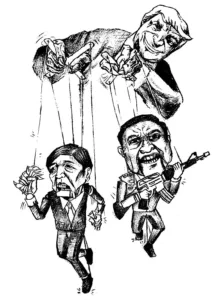1. Worsening crisis and aggressiveness of imperialism
The economic and financial crisis that burst out in the US and spread throughout the world in 2008 has persisted and become aggravated as a global depression. That is because the imperialist states have continued to cling to the US-dictated policy of neoliberal globalization. Under the auspices of this policy, the financial oligarchy and the rest of the monopoly bourgeoisie have continued to make profits in the real economy by pressing down the incomes and social benefits of the working people and in the financial markets by generating and manipulating speculative capital.
Public money has been used to bail out the big banks and corporations, improve their balance sheets and revive the stock market. Even the much touted stimulus packages doled out to the favored corporations are subject to their labor-cost saving and profit-making decisions. Thus, there is no real economic recovery. The general trend is for production and employment to stagnate and decline. Underconsumption and poverty are increasing as more people suffer unemployment, lower income, and rising prices of basic commodities and services.
Public deficits and the public debt have soared because of tax cuts, subsidies, overpriced contracts and bailouts for the big bourgeoisie and quite conspicuously because of the mounting debt service and the rising expenditures for military production and for military intervention and aggression. But the public sector employees and the rest of the working people and even the decreasing level of government social spending are blamed for the soaring public deficits and public debt. They are all scapegoated for the adoption of austerity measures which pass further the burden of crisis to the working people.
The imperialist powers are united in applying the anti-worker, anti-social and anti-environment bias of the neoliberal economic policy. But among them, there are increasing contradictions regarding economic, financial and trade policies. There are growing trends of protectionism and the use of fiscal measures to stimulate demand and rebuild the infrastructure. Amidst the growing indecisiveness of the G-8 and the G-20 and such multilateral agencies as the IMF, World Bank and the WTO, China, Russia, India, Brazil and South Africa are combining to develop their own position relative to the crisis of the world capitalist system.
In more than three decades of neoliberal economic policy, the chronic crisis of overproduction in the world capitalist system was accelerated, deepened and aggravated. But it was made to appear that the crisis was always being solved or overcome by limitless debt financing at the level of the households, the corporations and the states. The constant creation of money, credit and derivatives was supposed to perpetuate a happy world of expanding production, upvaluation of assets and speculative bubbles.
While the big bourgeois railed against supposed wage inflation and big social spending by government, they had no compunction about pouring public funds into military production and deployment of military forces abroad. The military industrial complex profited from the overpriced contracts with the state. These are considered to have buoyed up the US economy since the high speed spending by Reagan for high tech military production in the 1980s, down to the military Keynesianism of Bush junior and the continuing rising military expenditures for military production and wars of aggression.
The ever worsening crisis of the world capitalist system is driving the imperialist powers headed by the US to increase military production and launch wars of aggression. The end of the Cold War upon the implosion of the Soviet Union has served to embolden the US and its NATO allies to engage in wars of aggression such as those against Yugoslavia, Iraq, Afghanistan and Libya. The increasing aggressiveness of the imperialist powers is driven by the domestic profit-seeking of the monopoly bourgeoisie and its scheme to expand economic territory abroad, as cheap sources of labor, oil and other raw materials, as markets and fields of investment, and as spheres of influence.
The imperialist powers are united against the oppressed peoples and nations and underdeveloped countries that assert national independence. But among themselves, they are increasingly beset by contradictions as they struggle for a redivision of the world. Certain countries that collaborated with the US and NATO in the aggression against Iraq subsequently became wary and formed the Shanghai Cooperation Organization (SCO). Most recently, China, Russia, India, Brazil and even Germany would not support the aggression on Libya.






